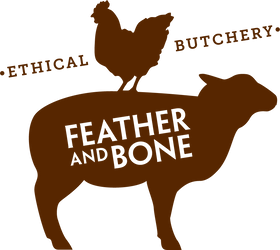Dim-witted butcher celebrates Meat Free Week
At this point, those of you who don’t believe that there is an inextricable link between human, plant and animal health and that our collective well-being depends on a holistic approach to all of it should avert your eyes.
Nobody told us that being butchers and promoting the idea of eating less, but better quality, meat might be contradictory and lead to commercial suicide so we went ahead and developed a business doing exactly that. In fact, we’ve followed our love of good food, interest in farming and concern for the environment and found ourselves on a fascinating journey that daily reinforces this idea.
That is, the more we learn about livestock production and meat, the more we realise the bleeding obvious which is that animals are just one component of an interconnected, natural system which is only as strong as the health of it’s component parts. For a cow to be healthy, the vegetation on which it feeds must be healthy.
Healthy vegetation can only occur when the soil is healthy and that only happens when the land carries the number of cows it can sustain without intervention. Which generally means less cows which, in turn, means eating less of them. What you’re actually eating isn’t cow, it’s soil. Which is itself the result of innumerable, dynamic, bio-chemical processes. Healthy, balanced soil is a cranking engine of microscopic destruction and creation which is brimming with nutrients and pulsing with life, all of which is passed up and down through the roots of the plants it sustains in a symbiotic movement. The best farmers know how to orchestrate this movement to the advantage of the entire system in which the cows, for example, may be seen as merely the horn section. Once you see things this way, there’s no going back and the world is revealed as a network of natural systems, none of the parts of which can be improved or sustained unless the whole is considered in the process.
So now, eight years or so down the track, we find ourselves scratching our heads and thinking that, instead of selling meat, what we’re really selling is soil - the concentrated essence of the goodness that is inherent in healthy, vibrant soil. Which is a bit peculiar for a butcher.
That brings us to Meat Free Week which starts on Monday 24 March and which, at first glance, looks like the kiss of death for yours truly (and may well prove to be so but we were dim-wittedly optimistic enough to get into this thing in the first place so we’ll just plod along and hope for the best). Meat Free Week is brought to you by Lainie Bracher and Melissa Dixon and funded by Voiceless.
Voiceless, along with The Australian Conservation Foundation and Bowel Cancer Australia, is also one of the three recipients of the money raised in donations during Meat Free Week.
The stated aim is as follows. ‘Meat Free Week is a national campaign dedicated to raising awareness of how much meat Australians eat and the impact eating too much has on your health, both individually and as a nation. It also intends to directly spotlight the negative effects over consumption of meat has on the environment and the impact it has on the welfare of animals.’
Our problem is that, while we obviously want you to flock to our door and reward us and the producers we represent for our hard work by showering us with gold, we are fundamentally in agreement with the idea of eating less but much better meat. Australians are the third highest per capita consumers of meat in the world and 90% of the pork and chicken we eat is factory farmed. The health, environment and welfare implications of these statistics are chilling and there’s no question that this consumption is unsustainable from every perspective. We applaud any initiative to encourage Australians to break out of what Sandor Katz calls the ‘confining and infantilising dependency of the role of consumer’ by questioning where their food comes from and how it is produced.
However, we do have a bone to pick with Meat Free Week because the concerns it’s designed to address apply exclusively to grain-fed and finished ruminants and factory farmed animals. These issues are NOT present in sustainably-managed livestock farming.




Only a very small proportion of what you’re eating – the cow – is the soil. Most (over 95%) of the contents of beef – C, N, H, O – come from the atmosphere, not the soil. Properly raised cows build soil, they don’t take away from it. A plant-based diet is only sustainable as a result of industrial horticulture, which destroys swathes of ecosystems to plant monocultures of chickpeas, soybeans, etc, which contain numerous industrial chemicals as well as anti-nutrients such as oxalates, tannins, phytates, salicilates among others. Meat however has no anti-nutrients. None. Show me one farmer who can produce tonnes of plant-foods in marginal soil and rainfall, and I’ll show you hundreds of farmers who can produce thousands of tonnes of beef and lamb on marginal soil and rainfall. Meat does not cause bowel cancer – that has been debunked completely.
Leave a comment